Unit 6 Being There课文翻译
- 格式:doc
- 大小:33.50 KB
- 文档页数:3
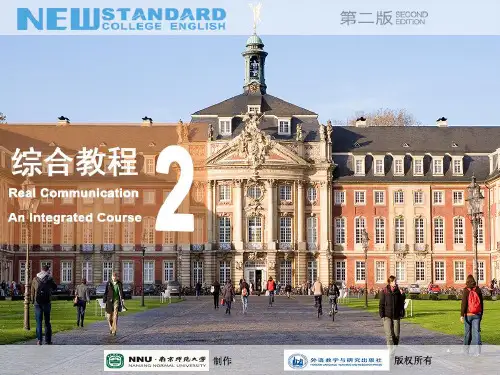
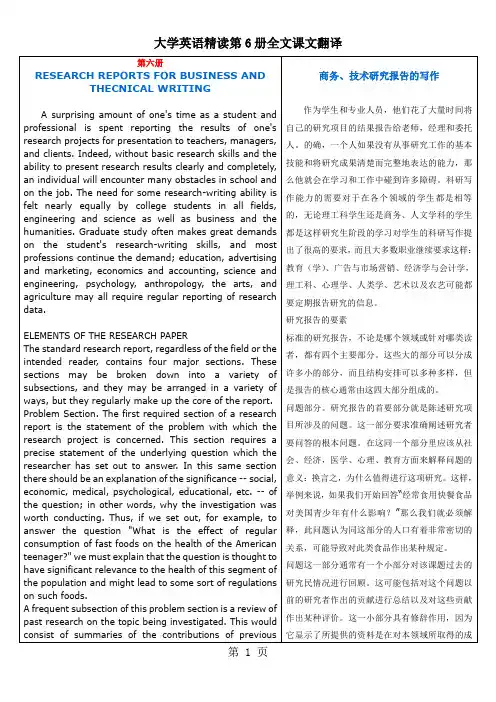
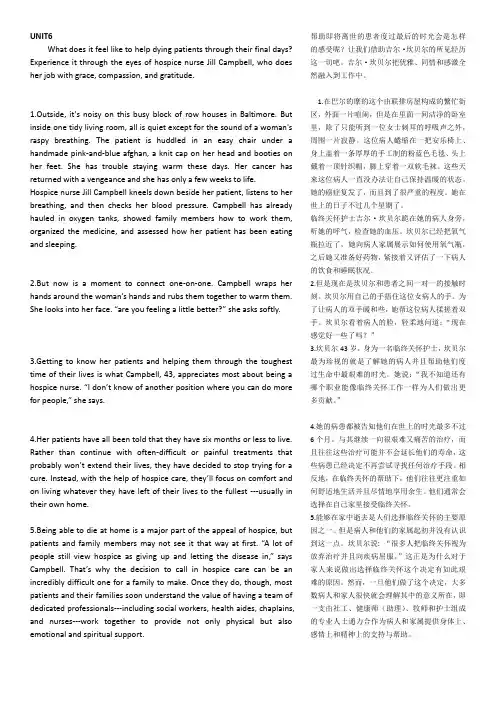
UNIT6What does it feel like to help dying patients through their final days? Experience it through the eyes of hospice nurse Jill Campbell, who does her job with grace, compassion, and gratitude.1.Outside, it's noisy on this busy block of row houses in Baltimore. But inside one tidy living room, all is quiet except for the sound of a woman's raspy breathing. The patient is huddled in an easy chair under a handmade pink-and-blue afghan, a knit cap on her head and booties on her feet. She has trouble staying warm these days. Her cancer has returned with a vengeance and she has only a few weeks to life. Hospice nurse Jill Campbell kneels down beside her patient, listens to her breathing, and then checks her blood pressure. Campbell has already hauled in oxygen tanks, showed family members how to work them, organized the medicine, and assessed how her patient has been eating and sleeping.2.But now is a moment to connect one-on-one. Campbell wraps her hands aro und the woman’s hands and rubs them together to warm them. She looks into her face. “are you feeling a little better?” she asks softly.3.Getting to know her patients and helping them through the toughest time of their lives is what Campbell, 43, appreciates most about being a hospice nurse. “I don’t know of another position where you can do more for people,” she says.4.Her patients have all been told that they have six months or less to live. Rather than continue with often-difficult or painful treatments that probably won’t extend their lives, they have decided to stop trying for a cure. Instead, with the help of hospice care, they’ll focus on comfort and on living whatever they have left of their lives to the fullest ---usually in their own home.5.Being able to die at home is a major part of the appeal of hospice, but patients and family members may not see it that way at first. “A lot of people still view hospice as giving up and letting the disease in,” says Campbell. That’s why the decision to c all in hospice care can be an incredibly difficult one for a family to make. Once they do, though, most patients and their families soon understand the value of having a team of dedicated professionals---including social workers, health aides, chaplains, and nurses---work together to provide not only physical but also emotional and spiritual support. 帮助即将离世的患者度过最后的时光会是怎样的感受呢?让我们借助吉尔·坎贝尔的所见经历这一切吧。

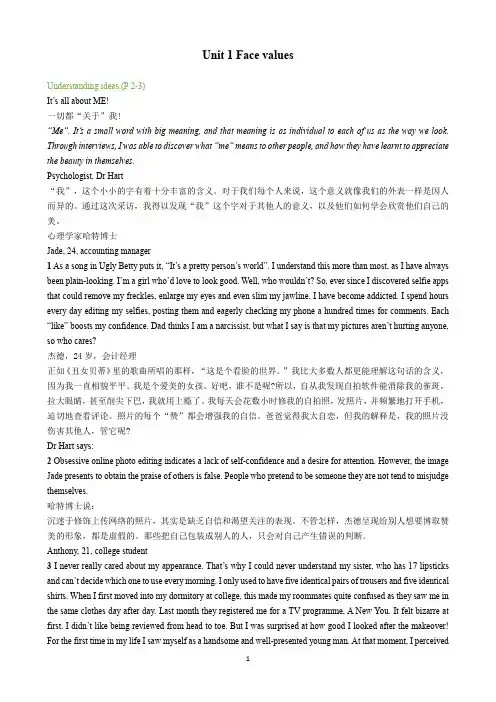
Unit 1 Face valuesUnderstanding ideas (P 2-3)It’s all about ME!一切都“关于”我!“Me”. It’s a small word with big meaning, and that meaning is as individual to each of us as the way we look. Through interviews, I was able to discover what “me” means to other people, and how they have learnt to appreciate the beauty in themselves.Psychologist, Dr Hart“我”,这个小小的字有着十分丰富的含义。
对于我们每个人来说,这个意义就像我们的外表一样是因人而异的。
通过这次采访,我得以发现“我”这个字对于其他人的意义,以及他们如何学会欣赏他们自己的美。
心理学家哈特博士Jade, 24, accounting manager1 As a song in Ugly Betty puts it, “It’s a pretty person’s world”. I understand this more than most, as I have always been plain-looking. I’m a girl who’d love to look good. Well, who wouldn’t? So, ever since I discovered selfie apps that could remove my freckles, enlarge my eyes and even slim my jawline, I have become addicted. I spend hours every day editing my selfies, posting them and eagerly checking my phone a hundred times for comments. Each “like” boosts my confidence. Dad thinks I am a narcissist, but what I say is that my pictures aren’t hurting anyone, so who cares?杰德,24岁,会计经理正如《丑女贝蒂》里的歌曲所唱的那样,“这是个看脸的世界。

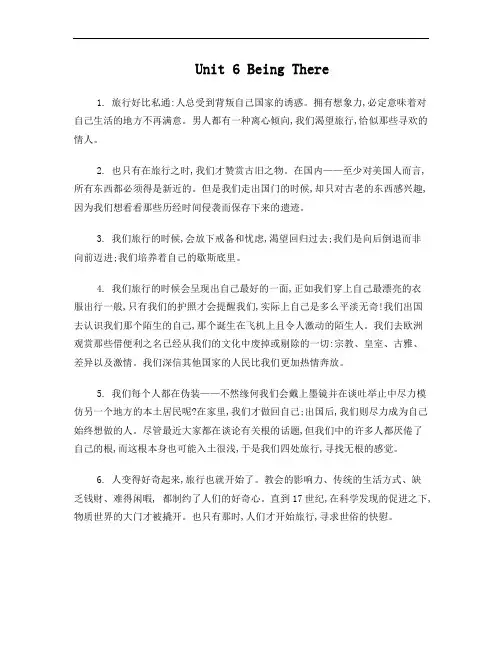
Unit 6 Being There1. 旅行好比私通:人总受到背叛自己国家的诱惑。
拥有想象力,必定意味着对自己生活的地方不再满意。
男人都有一种离心倾向,我们渴望旅行,恰似那些寻欢的情人。
2. 也只有在旅行之时,我们才赞赏古旧之物。
在国内——至少对美国人而言,所有东西都必须得是新近的。
但是我们走出国门的时候,却只对古老的东西感兴趣,因为我们想看看那些历经时间侵袭而保存下来的遗迹。
3. 我们旅行的时候,会放下戒备和忧虑,渴望回归过去;我们是向后倒退而非向前迈进;我们培养着自己的歇斯底里。
4. 我们旅行的时候会呈现出自己最好的一面,正如我们穿上自己最漂亮的衣服出行一般,只有我们的护照才会提醒我们,实际上自己是多么平淡无奇!我们出国去认识我们那个陌生的自己,那个诞生在飞机上且令人激动的陌生人。
我们去欧洲观赏那些借便利之名已经从我们的文化中废掉或剔除的一切:宗教、皇室、古雅、差异以及激情。
我们深信其他国家的人民比我们更加热情奔放。
5. 我们每个人都在伪装——不然缘何我们会戴上墨镜并在谈吐举止中尽力模仿另一个地方的本土居民呢?在家里,我们才做回自己;出国后,我们则尽力成为自己始终想做的人。
尽管最近大家都在谈论有关根的话题,但我们中的许多人都厌倦了自己的根,而这根本身也可能入土很浅,于是我们四处旅行,寻找无根的感觉。
6. 人变得好奇起来,旅行也就开始了。
教会的影响力、传统的生活方式、缺乏钱财、难得闲暇, 都制约了人们的好奇心。
直到17世纪,在科学发现的促进之下,物质世界的大门才被撬开。
也只有那时,人们才开始旅行,寻求世俗的快慰。
7. 旅行可增长见识,可洞悉本国或异域的文化,可造就现代人的厌倦感。
类似十字军东征的元素在现代旅行者身上依然存在,只不过他是个人出征,这是驱使他远离家乡,进行说不清道不明的精神征战的一种冲动。
8. 当然,旅行最普通的原因就是为了远离家乡。
弗洛伊德说我们旅行是为了逃离父亲和家庭,而我们也可以补充说是为了逃离我们熟悉的一切。
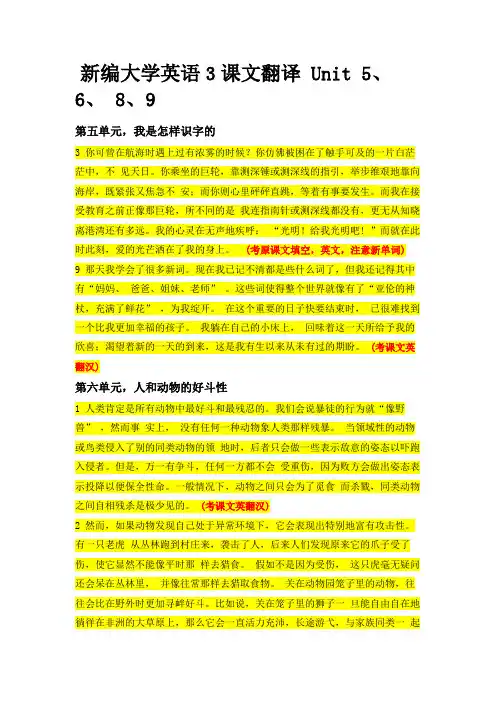
新编大学英语3课文翻译 Unit 5、6、 8、9第五单元,我是怎样识字的3 你可曾在航海时遇上过有浓雾的时候?你仿佛被困在了触手可及的一片白茫茫中,不见天日。
你乘坐的巨轮,靠测深锤或测深线的指引,举步维艰地靠向海岸,既紧张又焦急不安;而你则心里砰砰直跳,等着有事要发生。
而我在接受教育之前正像那巨轮,所不同的是我连指南针或测深线都没有,更无从知晓离港湾还有多远。
我的心灵在无声地疾呼:“光明!给我光明吧! ”而就在此时此刻,爱的光芒洒在了我的身上。
(考原课文填空,英文,注意新单词) 9 那天我学会了很多新词。
现在我已记不清都是些什么词了,但我还记得其中有“妈妈、爸爸、姐妹、老师”。
这些词使得整个世界就像有了“亚伦的神杖,充满了鲜花”,为我绽开。
在这个重要的日子快要结束时,已很难找到一个比我更加幸福的孩子。
我躺在自己的小床上,回味着这一天所给予我的欣喜;渴望着新的一天的到来,这是我有生以来从未有过的期盼。
(考课文英翻汉)第六单元,人和动物的好斗性1 人类肯定是所有动物中最好斗和最残忍的。
我们会说暴徒的行为就“像野兽”,然而事实上,没有任何一种动物象人类那样残暴。
当领域性的动物或鸟类侵入了别的同类动物的领地时,后者只会做一些表示敌意的姿态以吓跑入侵者。
但是,万一有争斗,任何一方都不会受重伤,因为败方会做出姿态表示投降以便保全性命。
一般情况下,动物之间只会为了觅食而杀戮,同类动物之间自相残杀是极少见的。
(考课文英翻汉)2 然而,如果动物发现自己处于异常环境下,它会表现出特别地富有攻击性。
有一只老虎从丛林跑到村庄来,袭击了人,后来人们发现原来它的爪子受了伤,使它显然不能像平时那样去猎食。
假如不是因为受伤,这只虎毫无疑问还会呆在丛林里,并像往常那样去猎取食物。
关在动物园笼子里的动物,往往会比在野外时更加寻衅好斗。
比如说,关在笼子里的狮子一旦能自由自在地徜徉在非洲的大草原上,那么它会一直活力充沛,长途游弋,与家族同类一起追捕食物。
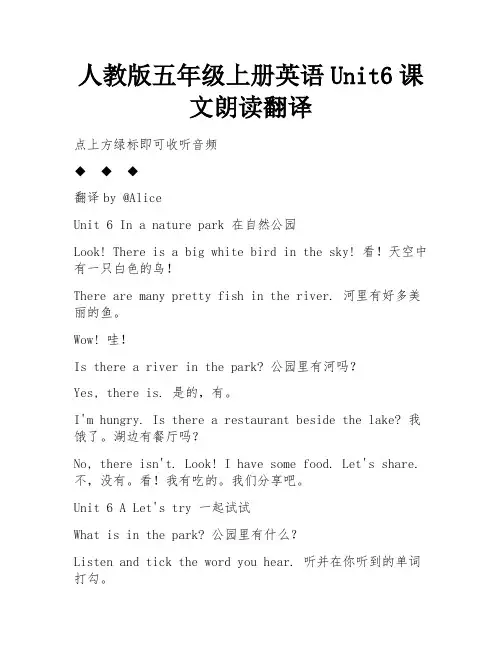
人教版五年级上册英语Unit6课文朗读翻译点上方绿标即可收听音频◆◆◆翻译by @AliceUnit 6 In a nature park 在自然公园Look! There is a big white bird in the sky! 看!天空中有一只白色的鸟!There are many pretty fish in the river. 河里有好多美丽的鱼。
Wow! 哇!Is there a river in the park? 公园里有河吗?Yes, there is. 是的,有。
I'm hungry. Is there a restaurant beside the lake? 我饿了。
湖边有餐厅吗?No, there isn't. Look! I have some food. Let's share. 不,没有。
看!我有吃的。
我们分享吧。
Unit 6 A Let's try 一起试试What is in the park? 公园里有什么?Listen and tick the word you hear. 听并在你听到的单词打勾。
Look at the map of the park. 看公园的地图。
Is there a forest in the park? 公园里有森林吗?Yes, there is. Here! 是的。
有。
这呢!Cool! I love trees. 好酷!我喜欢树。
Unit 6 A Let's talk 一起说吧Children, let's go to the forest! 孩子们,我们去森林吧!Yeah! 好!Is there a river in the forest, Miss White? 怀特小姐,森林里有河吗?No, there isn't. 不,没有。
Is there a lake, Miss White? 怀特小姐,有河吗?Yes, there is and there are some small boats. 有,有河还有一些小船。
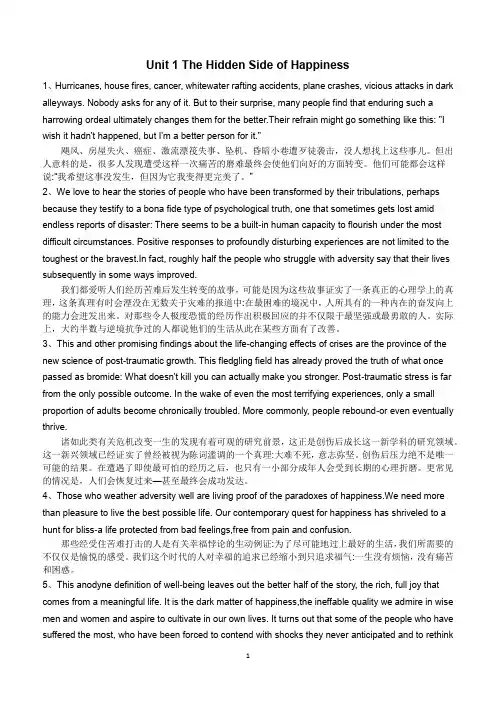
Unit 1 The Hidden Side of Happiness1、Hurricanes, house fires, cancer, whitewater rafting accidents, plane crashes, vicious attacks in dark alleyways. Nobody asks for any of it. But to their surprise, many people find that enduring such a harrowing ordeal ultimately changes them for the better.Their refrain might go something like this: "I wish it hadn't happened, but I'm a better person for it."飓风、房屋失火、癌症、激流漂筏失事、坠机、昏暗小巷遭歹徒袭击,没人想找上这些事儿。
但出人意料的是,很多人发现遭受这样一次痛苦的磨难最终会使他们向好的方面转变。
他们可能都会这样说:“我希望这事没发生,但因为它我变得更完美了。
”2、We love to hear the stories of people who have been transformed by their tribulations, perhaps because they testify to a bona fide type of psychological truth, one that sometimes gets lost amid endless reports of disaster: There seems to be a built-in human capacity to flourish under the most difficult circumstances. Positive responses to profoundly disturbing experiences are not limited to the toughest or the bravest.In fact, roughly half the people who struggle with adversity say that their lives subsequently in some ways improved.我们都爱听人们经历苦难后发生转变的故事,可能是因为这些故事证实了一条真正的心理学上的真理,这条真理有时会湮没在无数关于灾难的报道中:在最困难的境况中,人所具有的一种内在的奋发向上的能力会进发出来。
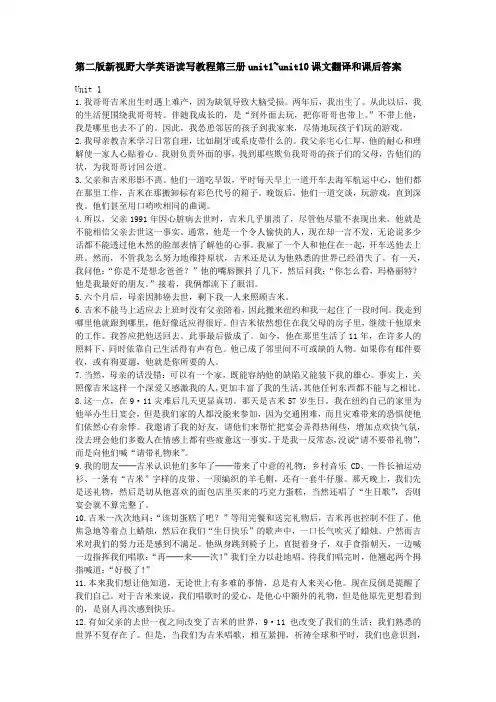
第二版新视野大学英语读写教程第三册unit1~unit10课文翻译和课后答案Unit 11.我哥哥吉米出生时遇上难产,因为缺氧导致大脑受损。
两年后,我出生了。
从此以后,我的生活便围绕我哥哥转。
伴随我成长的,是“到外面去玩,把你哥哥也带上。
”不带上他,我是哪里也去不了的。
因此,我怂恿邻居的孩子到我家来,尽情地玩孩子们玩的游戏。
2.我母亲教吉米学习日常自理,比如刷牙或系皮带什么的。
我父亲宅心仁厚,他的耐心和理解使一家人心贴着心。
我则负责外面的事,找到那些欺负我哥哥的孩子们的父母,告他们的状,为我哥哥讨回公道。
3.父亲和吉米形影不离。
他们一道吃早饭,平时每天早上一道开车去海军航运中心,他们都在那里工作,吉米在那搬卸标有彩色代号的箱子。
晚饭后,他们一道交谈,玩游戏,直到深夜。
他们甚至用口哨吹相同的曲调。
4.所以,父亲1991年因心脏病去世时,吉米几乎崩溃了,尽管他尽量不表现出来。
他就是不能相信父亲去世这一事实。
通常,他是一个令人愉快的人,现在却一言不发,无论说多少话都不能透过他木然的脸部表情了解他的心事。
我雇了一个人和他住在一起,开车送他去上班。
然而,不管我怎么努力地维持原状,吉米还是认为他熟悉的世界已经消失了。
有一天,我问他:“你是不是想念爸爸?”他的嘴唇颤抖了几下,然后问我:“你怎么看,玛格丽特?他是我最好的朋友。
”接着,我俩都流下了眼泪。
5.六个月后,母亲因肺癌去世,剩下我一人来照顾吉米。
6.吉米不能马上适应去上班时没有父亲陪着,因此搬来纽约和我一起住了一段时间。
我走到哪里他就跟到哪里,他好像适应得很好。
但吉米依然想住在我父母的房子里,继续干他原来的工作。
我答应把他送回去。
此事最后做成了。
如今,他在那里生活了11年,在许多人的照料下,同时依靠自己生活得有声有色。
他已成了邻里间不可或缺的人物。
如果你有邮件要收,或有狗要遛,他就是你所要的人。
7.当然,母亲的话没错:可以有一个家,既能容纳他的缺陷又能装下我的雄心。
选修八英语课文翻译(1) [选修八英语课文翻译]选修八英语课文翻译导语:课文是指指教科书中的正文,区别于注释和习题等,一般在语文或地理中出现。
英语,有对话和短文。
以下是小编收集整理的选修八英语课文翻译,希望大家喜欢!选修八英语课文翻译Unit1 CALIFORNIA加利福尼亚California is the third largest state in the USA but has the largest population。
加州是美国第三大洲,而且是人口最多的州。
It also has the distinction of being the most multicultural state in the USA, having attracted people from all over the world。
加州与众不同之处在于它也是美国最具多元文化的一个州。
它吸引了来自世界各地的人们。
The customs and languages of the immigrants live on in their new home。
这些移民的风俗习惯以及语言在他们的新家都得以延续。
This diversity of culture is not surprising when you know thehistory of California。
当你了解了加利福尼亚的历史,你就不会对其文化的多样性感到惊奇了。
NATIVE AMERCANS美洲土著人Exactly when the first people arrived in what we now know as California, no one really knows。
最早一批人具体是什么时候来到我们现在了解的加利福尼亚地区的,谁也说不清楚。
However, it is likely that Native Americans were living in California at least fifteen thousand years ago。
Unit 6 Saving Nature,But Only for Man仅为人类拯救自然Charles Krauthammer1. Environmental sensitivity is now as required an attitude in polite society as is, say, belief in democracy. But now that everyone from Ted Turner to George Bush, Dow to Exxon has professed love for Mother Earth, how are we to choose among the dozens of conflicting proposals, restrictions, projects, regulations and laws advanced in the name of the environment? Clearly not everything with an environmental claim is worth doing. How to choose?在当今文明社会中,对环境的敏感性就像对民主的信仰一样是一种不可或缺的态度。
但是现在从TT到BU,从D到EXXON的每个人都表达了对地球的热爱。
我们如何在以环境之名提出的许多相互矛盾的建议,约束,提案,中进行选择?显而易见,并不是每件冠以环境之名的提议都值得去尝试,我们该如何选择呢?2. There is a simple way. First, distinguish between environmental luxuries and environmental necessities. Luxuries are those things it would be nice to have if costless. Necessities are those things we must have regardless. Then apply a rule. Call it the fundamental axiom of sane environmentalism: Combatting ecological change that directly threatens the health and safety of people is an environmental necessity. All else is luxury.这里有一种简便的方法,首先,要区分什么是保护环境的奢侈品,什么是保护环境的必需品。
Unit 6"Don't ever mark(作记号)in a book!" Thousands of teachers, librarians(图书管理员)and parents have so advised. But Mortimer Adler disagrees. He thinks so long as you own the book and needn't preserve(保护) its physical appearance(外表), marking it properly will grant(承认,授予)you the ownership(所有权)of the book in the true sense of the word(真正意义上地) and make it a part of yourself.“不要在书上做记号!”无数教师、图书管理员和家长都曾这样建议。
但是莫蒂默•艾德勒并不同意。
他认为只要你拥有这本书而且不需要保护它的外观,做记号将会让你真正意义上拥有这本书并且使它成为你的一部分。
HOW TO MARK A BOOK怎样在书上做记号Mortimer J. AdlerPara.1You know you have to read "between the lines(体会字里行间的言外之意)" to get the most out of anything(最有效的使用,发挥最大功效). I want to persuade(说服)you to do something equally important in the course of your reading. I want to persuade you to "write between the lines." Unless you do, you are not likely to do the most efficient(有效率的) kind of reading. 你知道读书要“深入字里行间”,以求最充分的理解。
新视野大学英语第二册读写教程课文翻译Unit 1 Text A An impressive Engli lsesson标题: 一堂难忘的英语课1. 如果我是唯一一个还在纠正小孩英语的家长,那么我儿子也许是对的。
对他而言,我是一个乏味的怪物:一个他不得不听其教诲的父亲,一个还沉湎于语法规则的人,对此我儿子似乎颇为反感。
2. 我觉得我是在最近偶遇我以前的一位学生时,才开始对这个问题认真起来的。
这个学生刚从欧洲旅游回来。
我满怀着诚挚期待问她:“欧洲之行如何?”3. 她点了三四下头,绞尽脑汁,苦苦寻找恰当的词语,然后惊呼:“真是,哇!”4. 没了。
所有希腊文明和罗马建筑的辉煌居然囊括于一个浓缩的、不完整的语句之中!我的学生以“哇!”来表示她的惊叹,我只能以摇头表达比之更强烈的忧虑。
5. 关于正确使用英语能力下降的问题,有许多不同的故事。
学生的确本应该能够区分诸如 their/there/they're 之间的不同,或区别 complimentary 跟complementary 之间显而易见的差异。
由于这些知识缺陷,他们承受着大部分不该承受的批评和指责,因为舆论认为他们应该学得更好。
6. 学生并不笨,他们只是被周围所看到和听到的语言误导了。
举例来说,杂货店的指示牌会把他们引向 stationary(静止处),虽然便笺本、相册、和笔记本等真正的stationery(文具用品)并没有被钉在那儿。
朋友和亲人常宣称 They've just ate。
实际上,他们应该说 They've just eaten。
因此,批评学生不合乎清理。
7. 对这种缺乏语言功底而引起的负面指责应归咎于我们的学校。
学校应对英语熟练程度制定出更高的标准。
可相反,学校只教零星的语法,高级词汇更是少之又少。
还有就是,学校的年轻教师显然缺乏这些重要的语言结构方面的知识,因为他们过去也没接触过。
学校有责任教会年轻人进行有效的语言沟通,可他们并没把语言的基本框架一一准确的语法和恰当的词汇一一充分地传授给学生。
大学英语第六册unit1AThe Pursuit of Happiness(The Pursuit of Happiness)The right to pursue happiness is promised to Americans by the US Constitution, but no one seems quite sure which way happiness runs. It may be we are issued a hunting license but offered no game. Jonathan Swift conceived of happiness as "the state of being well-deceived", or of being "a fool among idiots ", for Swift saw society as a land of false goals.It is, of course, un-American to think in terms of false goals. We do, however, seem to be dedicated to the idea of buying our way to happiness. We shall all have made it to Heaven when we possess enough.And at the same time the forces of American business are hugely dedicated to making us deliberately unhappy. Advertising is one of our major industries, and advertising exists not to satisfy desires but to create them — and to create them faster than anyone's budget can satisfy them. For that matter, our whole economy is based on addicting us to greed. We are even told it is our patriotic duty to support the national economy by buying things.Look at any of the magazines that cater to women. There advertising begins as art and slogans in the front pages and ends as pills and therapy in the back pages. The art at the front illustrates the dream of perfect beauty. This is the baby skin that must be hers. This, the perfumed breath she must breathe out. This, the sixteen-year-old figure she must display at forty, at fifty, at sixty, and forever. This is the harness into which Mother must strap herself in order to display that perfect figure. This is the cream that restores skin, these are the tablets that melt away fat around the thighs, and these are the pills of perpetual youth.Obviously no reasonable person can be completely persuaded either by such art or by such pills and devices. Yet someone is obviously trying to buy this dream and spending billions every year in the attempt. Clearly the happiness-market is not running out of customers, but what is it they are trying to buy?Defining the meaning of "happiness" is a perplexing proposition: the best one can do is to try to set some extremes to the idea and then work towards the middle. To think of happiness as achieving superiority over others, living in a mansion made of marble, having a wardrobe with hundreds of outfits, will do to set the greedy extreme. To think of happiness as the joy of a holy man of India will do to set the spiritual extreme. He sits completely still, contemplating the nature of reality, free even of his own body. If admirers bring him food, he eats it; if not, he starves. Why be concerned? What is physical is trivial to him. To contemplate is his joy and he achieves complete mental focus through an incredibly demanding discipline, the accomplishment of which is itself a joy to him.Is he a happy man? Perhaps his happiness is only another sort of illusion. But who can take it from him? And who will dare say it is more false than happiness paid for through an installment plan?Although the holy man's concept of happiness may enjoy considerable prestige in the Orient, I doubt the existence of such motionless happiness. What is certain is that his way of happiness would be torture to almost anyone of Western temperament. Yet these extremes will still serve to define the area within which all of us must find some sort of balance. Thoreau had his own firm sense of that balance: save on the petty in order to spend on the essential.Possession for its own sake or in competition with the rest of the neighborhood would have been Thoreau's idea of the petty. The active discipline of raising one's perception of what is eternal in nature would have been his idea of the essential. Time saved on the petty could be spent on the essential. Thoreau certainly didn't intend to starve, but he would put into feeding himself only as much effort as would keep him functioning for more important efforts.Effort is the essence of it: there is no happiness except as we take on challenges. Short of the impossible, the satisfactions we get from a lifetime depend on how high we place our difficulties. The mortal flaw in the advertised version of happiness is in the fact that it claims to be effortless.We demand difficulty even in our diversions. We demand it because without difficulty there can be no game; a game is a way of making something hard for the fun of it. The rules of the game are an arbitrary addition of difficulty. It is easier to win at chess if you are free to change the rules, but the fun is in winning within the rules. If we could mint our own money, even building a fortune would become boring. No difficulty, no fun.Those in advertising seem too often to have lost their sense of the pleasure of difficulty. And the Indian holy man seems dull to us, I suppose, because he seems to be refusing to play anything at all. The Western weakness may be in the illusion that happiness can be bought. Perhaps the oriental weakness is in the idea that there is such a thing as perfect happiness.Happiness is never more than partial. Whatever else happiness may be, it is neither in having nor in being, but in becoming. What the writers of the Constitution declared for us as an inherent right was not happiness but the pursuit of happiness. What the early patriots might have underlined, could they have foreseen the happiness-market, is the cardinal fact that happiness is in the pursuit itself, in the pursuit of what is engaging and life-changing, which is to say, in the idea of becoming. A nation is not measured by what it possesses or wants to possess, but by what it wants to become.(Words: 1,005)追求幸福美国宪法赋予美国人民追求幸福的权利,但是似乎谁也说不清幸福跑到哪里去了。
Unit 6Being ThereAnatole Broyard1. Travel is like adultery: one is always tempted to be unfaithful to one’s own country. To have imagination is inevitably to be dissatisfied with where you live. There is in men a centrifugal tendency. In our wanderlust, we are lovers looking for consummation.2. Only while traveling can we appreciate age. At home, for Americans at least, everything must be young, new, but when we go abroad we are interested only in the old. We want to see what has been saved, defended against time.3. When we travel, we put aside our defenses, our anxiety, and invite regression. We go backward instead of forward. We cultivate our hysteria.4. It is our best selves that travel, just as we dress in our best clothes. Only our passport reminds us how ordinary we actually are. We go abroad to meet our foreign persona, that thrilling stranger born on the plane. We’re going to see in Europe everything we have eliminated or edited out of our own culture in the name of convenience: religion, royalty, picturesqueness, otherness — and passion. We cling to the belief that other peoples are more passionate than we are.5. There’s an impostor in each of us — why else would we put on dark glasses and try to speak and look like the natives of another place? At home, we impersonate ourselves; when we’re abroad, we can try to be what we’ve always wanted to be. In spite of all the recent talk about roots, many of us are tired of our roots, which may be shallow anyway, and so we travel in search of rootlessness.6. Traveling began when men grew curious. The influence of the church, the traditional pattern of life, the lack of money and leisure had all restrained curiosity until the seventeenth century, when under pressure of scientific discoveries, the physical world began to gape open. It was then that people began to travel in search of the profane.7. Travel arrived together with sophistication, with the ability to see through or beyond one’s own culture, with the modern faculty of boredom. Something o f the Crusades survives in the modern traveler — only this is a personal crusade, an impulse to go off and fight certain obscure battles of his own spirit.8. Of course, one of the most common reasons for traveling is simply to get away. Freud said that we travel to escape father and the family, and we might add the familiar. There is a recurrent desire to drop our lives, to simply walk out of them.9. When we travel, we are on vacation —vacant, waiting to be filled. The frenzied shopping of some travelers is an attempt to buy a new life. To get away to a strange place produces a luxurious feeling of disengagement, of irresponsible free association. One is an onlooker, impregnable.10. We travel in summer, when life comes out of doors, and so we see only summery people, nothing of their sad falls, their long, dark winters and cruel springs. The places we visit are gold-plated by the sun. The flowers and trees are like bouquets thrown to history.11. And language — what a pleasure to leave our own language, with its clichés stuck in our teeth. How much better things sound in another tongue! It’s like having our ears cleaned out. So long as we don’t understand it too well, every other language is poetry.12. Because we travel for so many reasons —some of them contradictory —travel writing is like a suitcase into which the writer tries to cram everything. At its most interesting, it’s a continual tasting, the expression of a nostalgia for the particular. It’s a childish game of playing countries, as we used to play house.13. Travel writing describes a tragic arc: it begins with a rising of the spirit and ends in a dying fall. The earliest travelers went to see marvels, to admire the wonderful diversity of the world — but the latest travelers are like visitors sitting at the bedside of dying cultures. Early travelers fell in love at first sight with foreign places — but now we know only love at last sight, a kiss before dying, a breathing in of the last gasp. In some ancient societies, it used to be the c ustom for the son to inhale his father’s last breath, which contained his departing soul, and today’s travelers do something like this, too.14. Travel writing has become a quintessentially modern thing, the present regretting the past. We travel like insurance appraisers, assessing the damage. Militantly opposed to any kind of ethnic distinctions at home, we adore ethnicity abroad. Ironically, Americans need Europe more than Europeans do. To Parisians, for example, Paris is a place to live; for Americans, it’s a place to dream.15. “I do not expect to see many travel books in the near future,” Evelyn Waugh wrote in 1946. He saw the world turning into a “monoculture,” the sense of place giving way toplacelessness. What Waugh didn’t foresee was that travel books would change as novels and poetry have, that every slippage of culture would provoke its peculiar literature. He underestimated the variousness of our reasons for traveling.16. There have always been travelers who went to look for the worst, to find rationalizations for their anxiety or despair, to cover their disillusionment with labels, as steamer trunks used to be covered with them. Why else would Paul Theroux go to South America, which he so obviously detested? Shiva Naipaul’s worst fears were confirmed in Africa, just as his brother’s were in Asia. Graham Greene spent four months traveling in the Liberian jungle as a private penance.17. Even ruins have changed. Instead of the classical ruins of antiquity, we now have places that are merely “ruined.” And there are travelers who take a positive delight in them, who love awfulness for its own sake. For them, awfulness is the contemporary equivalent of the exotic. It’s a negative sublime, a swoon or ecstasy of spoliation.18. As other countries offer fewer exotic phenomena, the travel writer is forced to find the exotic in himself —and the picturesque as well. The centrifugal tendency turns centripetal, and modern travel books may be about the absence of things just as the classic books are about their presence. In Journey to Kars, Philip Glazebrook seems to have visited several unappealing villages in Turkey simply for the irony of being there. (Irony is the contemporary traveler’s drip-dry shirt.) One of the things a severely sophisticated traveler like Glazebrook seeks is a place where he himself can stand out in absolute relief.19. Perhaps in the future we shall have to travel like James Holman, who, after being invalided out of the British navy because he had gone blind, set out in 1819 to see the world. Traveling mostly alone, speaking no foreign languages, using only public transport, Holman got as far as Siberia and returned home to publish in several thick volumes all that he had experienced. He rarely felt, he said, that he had missed anything through being blind. (At one point, he met a deaf man and they traveled together.)20. Since he could not see, people often invited Holman to squeeze things as a way of perceiving them —and this is what today’s traveler has to do. He has to squee ze the places he visits, until they yield something, anything.1. 旅行好比私通:人总受到背叛自己国家的诱惑。